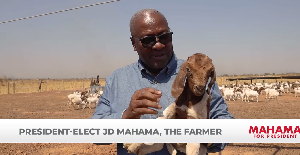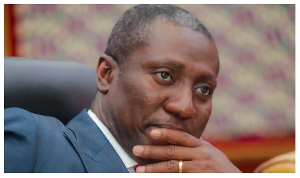Accra, Nov. 26, GNA - Mr Wilfred Apatu, President of the Ghana Institution of Engineers, has suggested to Government to allocate one per cent of the Gross Domestic Product (GDP) to the promotion of technology and its transfer, beginning from next year.
According to Mr Apatu, presently, the country's resource allocation to Science and Technology fluctuates between 0.3 and 0.5 per cent of the GDP, well below the target of one per cent prescribed under the Lagos Plan of Action in 1980.
Mr Apatu made the suggestion when he delivered the 35th Presidential Address of the Institution in Accra, on Thursday. The Address was in fulfilment of the Institution's mandate for the incumbent President to deliver an address mid-way into his tenure of office.
The theme of the address was "Technology Transfer- the Key Driving Force for Wealth Creation in Ghana."
Mr Apatu said the cost of the imports in the 2004 budget ranged from 362 billion to 507 billion cedis, and pointed out that, part of the monies used on the imports should be used to domesticate, develop and commercialise a technology.
He listed some of the proposed procurement or fabrication of machinery/equipment in the 2004 budget as manual cassava harvesters, 100 pieces of cassava graters, 100 solar driers, identification of gaps in the agro-processing of crops and the development of the appropriate agro-processing machinery and the construction of 90 small span bridges. But these items would have to be imported if they were required to be delivered by the end of 2004.
Mr Apatu advocated legal establishment of an apex body, which he called "TECHGHANA" to co-ordinate, regulate, promote the four technology component promotion agencies of Facilities Embodied Technology, Person Embodied Technology, Document Embodied Technology and Institution-Embodied technology in the acquisition and transfer of technology.
He said when the apex body was formed, it would also ensure that part of the Public Procurement was channelled in such a way as to be of benefit to technology development.
Mr Apatu underscored an urgent need "to re-engineer the politics of this country to appreciate the potentials of engineering contributions towards wealth creation.
"...The future of technology development and its transfer for wealth creation is in our hands. We should and must take up this challenge or else, we shall forever stand accused by posterity," Mr Apatu said. He enjoined the Government to address Technical Capacity Building of the persons and institutions that facilitated technology transfer. Mr Apatu identified the GRATIS Foundation and the Institution of Industrial Research or the Council for Scientific and Industrial Research (CSIR), but argued that the IIR concentrated on research into technology adaptations and innovations to suit the Ghanaian situation, while GRATIS and others concentrated on the production and technology transfer to facilitate agro- processing and transportation, and also to bring indigenous firms like Kristo Asafo on board.
He further advocated an amalgamation of GRATIS and IIR, to complement the work of each other.
Mr Apatu said there was the need to establish foundries and machine tool shops to provide the needed support services to the needed sectors, and also develop iron and steel works in the country.
Mr Alan John Kyerematen, Minister of Trade, Industry and President's Special Initiatives, who chaired the function, said after decades of independence Ghana had still not had a deep appreciation in Science and Technology, nor industrial landscape.
He said after establishing stability, growth was the next, but industrial growth depended on available technology . Mr Kyeramaten said it was necessary to resolve the debate on whether the nation would go in for adaptation rather than original research.
Click to view details



Business News of Friday, 26 November 2004
Source: GNA
















